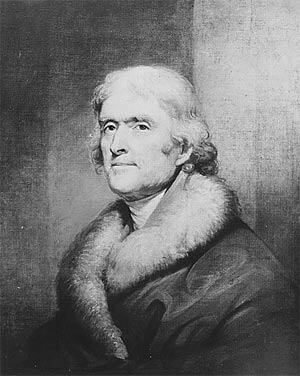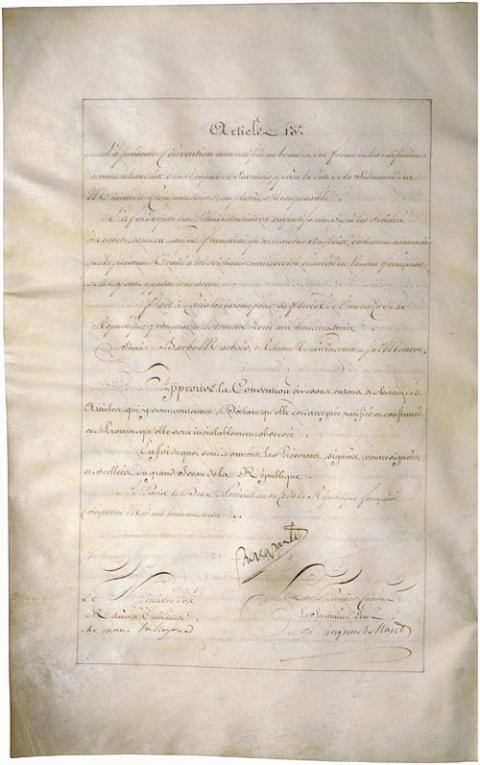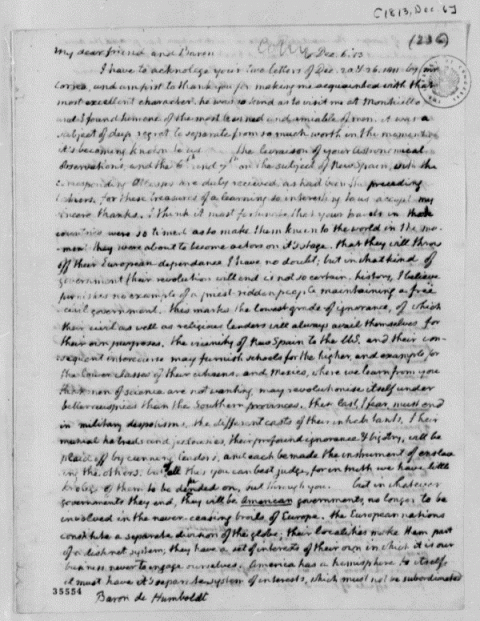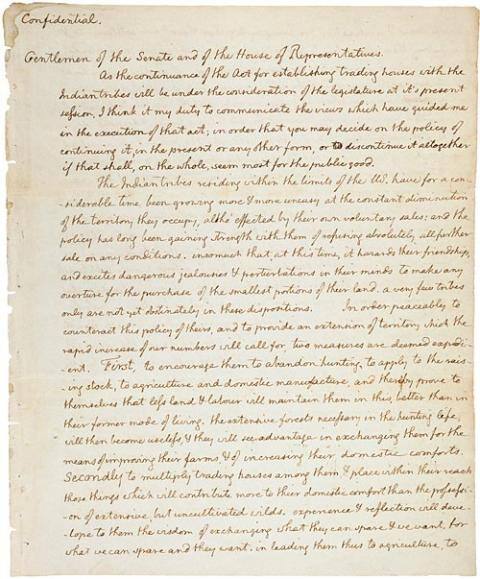Thomas Jefferson
 "If we are constrained to lift the hatchet against any tribe, we will never lay it down until that tribe is exterminated, or driven beyond the Mississippi."
"If we are constrained to lift the hatchet against any tribe, we will never lay it down until that tribe is exterminated, or driven beyond the Mississippi."
Thomas Jefferson to Secretary of War General Henry Dearborn, 1807.
Theme:
Shared HistoryTopics:
U.S. GovernmentPermissions beyond the scope of this license may be available at Copyright and Use Information.
Bibliography
The Thomas Jefferson Papers, 1606-1827. Library of Congress, Manuscript Division.
Resources for Further Research
Primary
The Thomas Jefferson Papers, 1606-1827. Library of Congress, Manuscript Division.
Related Documents

Lousiana Purchase
The Louisiana Purchase was the acquisition by the United States of America in 1803 of 828,000 square miles of France's claim to the territory of Louisiana. The U.S. paid $11,250,000 plus cancellation of debts worth 3,750,000, for a total sum of 15 million dollars (less than 3 cents per acre) for the Louisiana territory ($233 million in 2011 dollars).
The Louisiana territory encompassed all or part of 15 current U.S. states and two Canadian provinces. The land purchased contained all of present-day Arkansas, Missouri, Iowa, Oklahoma, Kansas, and Nebraska; parts of Minnesota that were west of the Mississippi River; most of North Dakota; most of South Dakota; northeastern New Mexico; northern Texas; the portions of Montana, Wyoming, and Colorado east of the Continental Divide; Louisiana west of the Mississippi River, including the city of New Orleans; and small portions of land that would eventually become part of the Canadian provinces of Alberta and Saskatchewan.
The purchase of the territory of Louisiana took place during the presidency of Thomas Jefferson. At the time, the purchase faced domestic opposition because it was thought that it was unconstitutional. Although he agreed that the U.S. Constitution did not contain provisions for acquiring territory, Jefferson decided to go ahead with the purchase anyway in order to remove France's presence in the region and to protect both U.S. trade access to the port of New Orleans and free passage on the Mississippi River.
Source: Louisiana Purchase Treaty, April 30, 1803; General Records of the U.S. Government; Record Group 11; National Archives.
TREATY BETWEEN THE UNITED STATES OF AMERICA AND THE FRENCH REPUBLIC The President of the United States of America and the First Consul of the French Republic in the name of the French People desiring to remove all Source of misunderstanding relative to objects of discussion mentioned in the Second and fifth articles of the Convention of the 8th Vendémiaire an 9 (30 September 1800) relative to the rights claimed by the United States in virtue of the Treaty concluded at Madrid the 27 of October 1795, between His Catholic Majesty & the Said United States, & willing to Strengthen the union and friendship which at the time of the Said Convention was happily reestablished between the two nations have respectively named their Plenipotentiaries to wit The President of the United States, by and with the advice and consent of the Senate of the Said States; Robert R. Livingston Minister Plenipotentiary of the United States and James Monroe Minister Plenipotentiary and Envoy extraordinary of the Said States near the Government of the French Republic; And the First Consul in the name of the French people, Citizen Francis Barbé Marbois Minister of the public treasury who after having respectively exchanged their full powers have agreed to the following Articles. Article I Whereas by the Article the third of the Treaty concluded at St Ildefonso the 9th Vendémiaire an 9 (1st October) 1800 between the First Consul of the French Republic and his Catholic Majesty it was agreed as follows. "His Catholic Majesty promises and engages on his part to cede to the French Republic six months after the full and entire execution of the conditions and Stipulations herein relative to his Royal Highness the Duke of Parma, the Colony or Province of Louisiana with the Same extent that it now has in the hand of Spain, & that it had when France possessed it; and Such as it Should be after the Treaties subsequently entered into between Spain and other States." And whereas in pursuance of the Treaty and particularly of the third article the French Republic has an incontestible title to the domain and to the possession of the said Territory--The First Consul of the French Republic desiring to give to the United States a strong proof of his friendship doth hereby cede to the United States in the name of the French Republic for ever and in full Sovereignty the said territory with all its rights and appurtenances as fully and in the Same manner as they have been acquired by the French Republic in virtue of the above mentioned Treaty concluded with his Catholic Majesty. Art: II In the cession made by the preceeding article are included the adjacent Islands belonging to Louisiana all public lots and Squares, vacant lands and all public buildings, fortifications, barracks and other edifices which are not private property.--The Archives, papers & documents relative to the domain and Sovereignty of Louisiana and its dependances will be left in the possession of the Commissaries of the United States, and copies will be afterwards given in due form to the Magistrates and Municipal officers of such of the said papers and documents as may be necessary to them. Art: III The inhabitants of the ceded territory shall be incorporated in the Union of the United States and admitted as soon as possible according to the principles of the federal Constitution to the enjoyment of all these rights, advantages and immunities of citizens of the United States, and in the mean time they shall be maintained and protected in the free enjoyment of their liberty, property and the Religion which they profess. Art: IV There Shall be Sent by the Government of France a Commissary to Louisiana to the end that he do every act necessary as well to receive from the Officers of his Catholic Majesty the Said country and its dependances in the name of the French Republic if it has not been already done as to transmit it in the name of the French Republic to the Commissary or agent of the United States. Art: V Immediately after the ratification of the present Treaty by the President of the United States and in case that of the first Consul's shall have been previously obtained, the commissary of the French Republic shall remit all military posts of New Orleans and other parts of the ceded territory to the Commissary or Commissaries named by the President to take possession--the troops whether of France or Spain who may be there shall cease to occupy any military post from the time of taking possession and shall be embarked as soon as possible in the course of three months after the ratification of this treaty. Art: VI The United States promise to execute Such treaties and articles as may have been agreed between Spain and the tribes and nations of Indians until by mutual consent of the United States and the said tribes or nations other Suitable articles Shall have been agreed upon. Art: VII As it is reciprocally advantageous to the commerce of France and the United States to encourage the communication of both nations for a limited time in the country ceded by the present treaty until general arrangements relative to commerce of both nations may be agreed on; it has been agreed between the contracting parties that the French Ships coming directly from France or any of her colonies loaded only with the produce and manufactures of France or her Said Colonies; and the Ships of Spain coming directly from Spain or any of her colonies loaded only with the produce or manufactures of Spain or her Colonies shall be admitted during the Space of twelve years in the Port of New-Orleans and in all other legal ports-of-entry within the ceded territory in the Same manner as the Ships of the United States coming directly from France or Spain or any of their Colonies without being Subject to any other or greater duty on merchandize or other or greater tonnage than that paid by the citizens of the United States. During that Space of time above mentioned no other nation Shall have a right to the Same privileges in the Ports of the ceded territory--the twelve years Shall commence three months after the exchange of ratifications if it Shall take place in France or three months after it Shall have been notified at Paris to the French Government if it Shall take place in the United States; It is however well understood that the object of the above article is to favour the manufactures, Commerce, freight and navigation of France and of Spain So far as relates to the importations that the French and Spanish Shall make into the Said Ports of the United States without in any Sort affecting the regulations that the United States may make concerning the exportation of the produce and merchandize of the United States, or any right they may have to make Such regulations. Art: VIII In future and for ever after the expiration of the twelve years, the Ships of France shall be treated upon the footing of the most favoured nations in the ports above mentioned. Art: IX The particular Convention Signed this day by the respective Ministers, having for its object to provide for the payment of debts due to the Citizens of the United States by the French Republic prior to the 30th Sept. 1800 (8th Vendémiaire an 9) is approved and to have its execution in the Same manner as if it had been inserted in this present treaty, and it Shall be ratified in the same form and in the Same time So that the one Shall not be ratified distinct from the other. Another particular Convention Signed at the Same date as the present treaty relative to a definitive rule between the contracting parties is in the like manner approved and will be ratified in the Same form, and in the Same time and jointly. Art: X The present treaty Shall be ratified in good and due form and the ratifications Shall be exchanged in the Space of Six months after the date of the Signature by the Ministers Plenipotentiary or Sooner if possible. In faith whereof the respective Plenipotentiaries have Signed these articles in the French and English languages; declaring nevertheless that the present Treaty was originally agreed to in the French language; and have thereunto affixed their Seals. Done at Paris the tenth day of Floreal in the eleventh year of the French Republic; and the 30th of April 1803. Robt R Livingston [seal] Jas. Monroe [seal] Barbé Marbois [seal]

Jefferson to Humboldt
Author: President Thomas Jefferson
Date: December 6, 1813.
In this letter, Jefferson discusses his ideas about the acculturation of American Indians after incidents of violence against U.S. citizens by British-allied Indian groups.
Source: The Thomas Jefferson Papers, 1606-1827. Thomas Jefferson to Baron von Humboldt, December 6, 1813. Library of Congress, Manuscript Division. [Electronic Record].
You know, my friend, the benevolent plan we were pursuing here for the happiness of the aboriginal inhabitants in our vicinities. We spared nothing to keep them at peace with one another. To teach them agriculture and the rudiments of the most necessary arts, and to encourage industry by establishing among them separate property. In this way they would have been enabled to subsist and multiply on a moderate scale of landed possession. They would have mixed their blood with ours, and been amalgamated and identified with us within no distant period of time. On the commencement of our present war, we pressed on them the observance of peace and neutrality, but the interested and unprincipled policy of England has defeated all our labors for the salvation of these unfortunate people. They have seduced the greater part of the tribes within our neighborhood, to take up the hatchet against us, and the cruel massacres they have committed on the women and children of our frontiers taken by surprise, will oblige us now to pursue them to extermination, or drive them to new seats beyond our reach. Already we have driven their patrons and seducers into Montreal, and the opening season will force them to their last refuge, the walls of Quebec. We have cut off all possibility of intercourse and of mutual aid, and may pursue at our leisure whatever plan we find necessary to secure ourselves against the future effects of their savage and ruthless warfare. The confirmed brutalization, if not the extermination of this race in our America, is therefore to form an additional chapter in the English history of the same colored man in Asia, and of the brethren of their own color in Ireland, and wherever else Anglo-mercantile cupidity can find a two-penny interest in deluging the earth with human blood. But let us turn from the loathsome contemplation of the degrading effects of commercial avarice.

Jefferson's Secret Message to Congress
This letter was written by Thomas Jefferson to members of Congress in 1803, outlining his plan of sending Meriwether Lewis and William Clark on an expedition west of the Mississippi River to lands not then a part of U.S. territory. The expedition was to gather information on people, geography, geology, and animal life so that the U.S. was in a better position to expand as a nation in the coming years.
He hoped that the expedition and expansion would encourage Indians to the West, who had refused to sell further land to the U.S., to change their minds, sell territory, and adapt to white life-ways. He was also aware of the bad reputations of some private traders among Indian nations, and hoped to gain the respect, favorable opinion, and business for U.S. government trading houses.
Source: President Thomas Jefferson's confidential message to Congress concerning relations with the Indians, January, 18, 1803; Record Group 233, Records of the United States House of Representatives, HR 7A-D1; National Archives. [Electronic Record]
Confidential Gentlemen of the Senate, and of the House of Representatives: As the continuance of the act for establishing trading houses with the Indian tribes will be under the consideration of the Legislature at its present session, I think it my duty to communicate the views which have guided me in the execution of that act, in order that you may decide on the policy of continuing it, in the present or any other form, or discontinue it altogether, if that shall, on the whole, seem most for the public good. The Indian tribes residing within the limits of the United States, have, for a considerable time, been growing more and more uneasy at the constant diminution of the territory they occupy, although effected by their own voluntary sales: and the policy has long been gaining strength with them, of refusing absolutely all further sale, on any conditions; insomuch that, at this time, it hazards their friendship, and excites dangerous jealousies and perturbations in their minds to make any overture for the purchase of the smallest portions of their land. A very few tribes only are not yet obstinately in these dispositions. In order peaceably to counteract this policy of theirs, and to provide an extension of territory which the rapid increase of our numbers will call for, two measures are deemed expedient. First: to encourage them to abandon hunting, to apply to the raising stock, to agriculture and domestic manufacture, and thereby prove to themselves that less land and labor will maintain them in this, better than in their former mode of living. The extensive forests necessary in the hunting life, will then become useless, and they will see advantage in exchanging them for the means of improving their farms, and of increasing their domestic comforts. Secondly: to multiply trading houses among them, and place within their reach those things which will contribute more to their domestic comfort, than the possession of extensive, but uncultivated wilds. Experience and reflection will develop to them the wisdom of exchanging what they can spare and we want, for what we can spare and they want. In leading them to agriculture, to manufactures, and civilization; in bringing together their and our settlements, and in preparing them ultimately to participate in the benefits of our governments, I trust and believe we are acting for their greatest good. At these trading houses we have pursued the principles of the act of Congress, which directs that the commerce shall be carried on liberally, and requires only that the capital stock shall not be diminished. We consequently undersell private traders, foreign and domestic, drive them from the competition; and thus, with the good will of the Indians, rid ourselves of a description of men who are constantly endeavoring to excite in the Indian mind suspicions, fears, and irritations towards us. A letter now enclosed, shows the effect of our competition on the operations of the traders, while the Indians, perceiving the advantage of purchasing from us, are soliciting generally, our establishment of trading houses among them. In one quarter this is particularly interesting. The Legislature, reflecting on the late occurrences on the Mississippi, must be sensible how desirable it is to possess a respectable breadth of country on that river, from our Southern limit to the Illinois at least; so that we may present as firm a front on that as on our Eastern border. We possess what is below the Yazoo, and can probably acquire a certain breadth from the Illinois and Wabash to the Ohio; but between the Ohio and Yazoo, the country all belongs to the Chickasaws, the most friendly tribe within our limits, but the most decided against the alienation of lands. The portion of their country most important for us is exactly that which they do not inhabit. Their settlements are not on the Mississippi, but in the interior country. They have lately shown a desire to become agricultural; and this leads to the desire of buying implements and comforts. In the strengthening and gratifying of these wants, I see the only prospect of planting on the Mississippi itself, the means of its own safety. Duty has required me to submit these views to the judgment of the Legislature; but as their disclosure might embarrass and defeat their effect, they are committed to the special confidence of the two Houses. While the extension of the public commerce among the Indian tribes, may deprive of that source of profit such of our citizens as are engaged in it, it might be worthy the attention of Congress, in their care of individual as well as of the general interest, to point, in another direction, the enterprise of these citizens, as profitably for themselves, and more usefully for the public. The river Missouri, and the Indians inhabiting it, are not as well known as is rendered desirable by their connexion with the Mississippi, and consequently with us. It is, however, understood, that the country on that river is inhabited by numerous tribes, who furnish great supplies of furs and peltry to the trade of another nation, carried on in a high latitude, through an infinite number of portages and lakes, shut up by ice through a long season. The commerce on that line could bear no competition with that of the Missouri, traversing a moderate climate, offering according to the best accounts, a continued navigation from its source, and possibly with a single portage, from the Western Ocean, and finding to the Atlantic a choice of channels through the Illinois or Wabash, the lakes and Hudson, through the Ohio and Susquehanna, or Potomac or James rivers, and through the Tennessee and Savannah, rivers. An intelligent officer, with ten or twelve chosen men, fit for the enterprise, and willing to undertake it, taken from our posts, where they may be spared without inconvenience, might explore the whole line, even to the Western Ocean, have conferences with the natives on the subject of commercial intercourse, get admission among them for our traders, as others are admitted, agree on convenient deposits for an interchange of articles, and return with the information acquired, in the course of two summers. Their arms and accoutrements, some instruments of observation, and light and cheap presents for the Indians, would be all the apparatus they could carry, and with an expectation of a soldier's portion of land on their return, would constitute the whole expense. Their pay would be going on, whether here or there. While other civilized nations have encountered great expense to enlarge the boundaries of knowledge by undertaking voyages of discovery, and for other literary purposes, in various parts and directions, our nation seems to owe to the same object, as well as to its own interests, to explore this, the only line of easy communication across the continent, and so directly traversing our own part of it. The interests of commerce place the principal object within the constitutional powers and care of Congress, and that it should incidentally advance the geographical knowledge of our own continent, cannot be but an additional gratification. The nation claiming the territory, regarding this as a literary pursuit, which is in the habit of permitting within its dominions, would not be disposed to view it with jealousy, even if the expiring state of its interests there did not render it a matter of indifference. The appropriation of two thousand five hundred dollars, "for the purpose of extending the external commerce of the United States," while understood and considered by the Executive as giving the legislative sanction, would cover the undertaking from notice, and prevent the obstructions which interested individuals might otherwise previously prepare in its way. TH. Jefferson Jan. 18. 1803.
